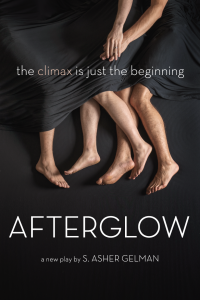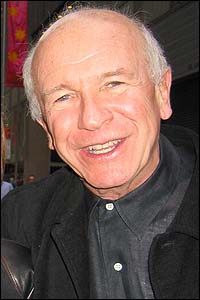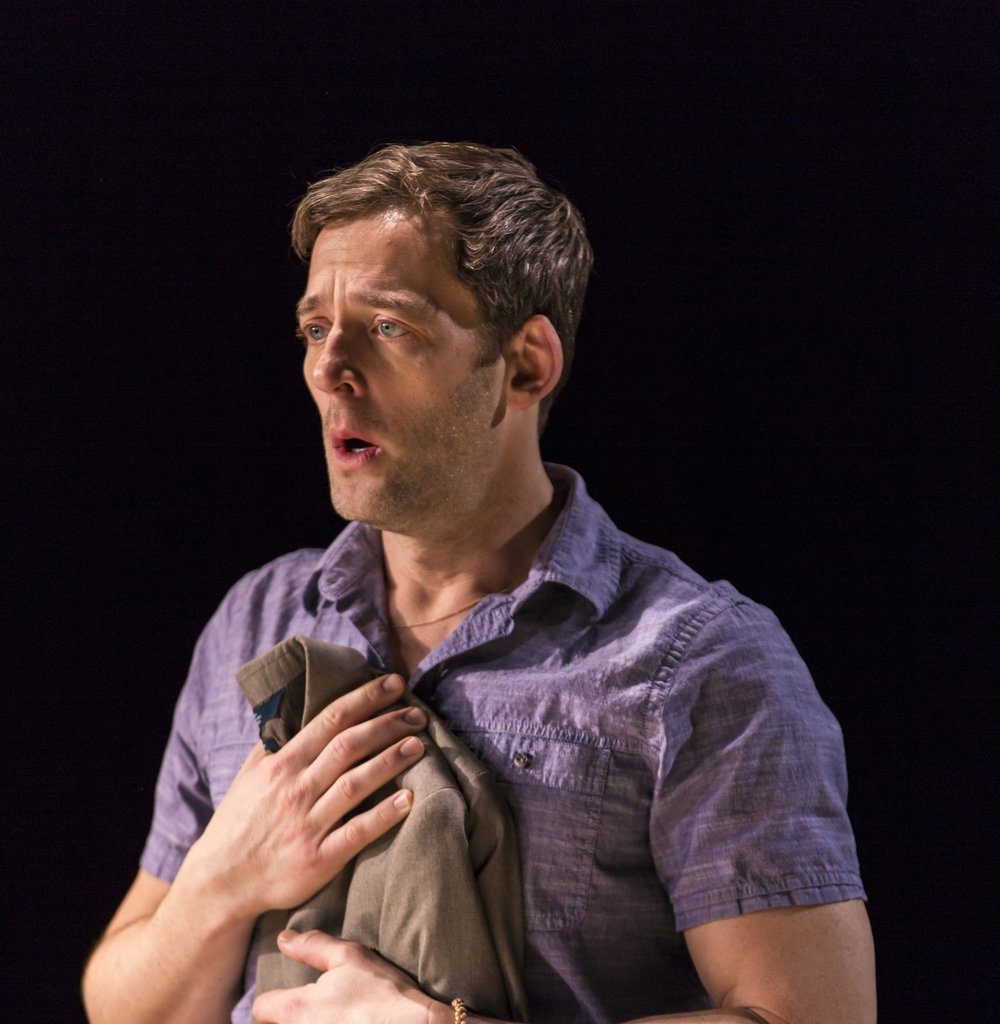 Afterglow
Afterglow
Written and Directed by S. Asher Gelman
Produced by Midnight Theatricals
The Loft at the Davenport Theatre
OKAY, AFTERGLOW is a very sexy show, but I don’t think most people go to the theater to see three good-looking young men lounging naked on a bed in the aftermath of a passionate threesome (whose moans and groans we’ve heard from behind curtains), then watch them shower together in various pairs—all this in the first fifteen minutes. With intermission, Afterglow runs more than two hours. That’s a lot of time to fill, and playwright-director S. Asher Gelman has his work cut out for him in this three-character play dealing with a settled gay couple, Josh and Alex, who are in the habit of bringing home a third just to mix it up. Sleepovers not allowed. But on this night, the fun gets serious as Josh finds the younger Darius, the evening’s party boy, to be of more than passing interest.
The setup proceeds at a tolerable pace, although the prospect of sitting through two hours about the injustices implicit in any threesome—especially the likelihood that the interloper will ultimately be left out in the cold—invited serious reservations. Fortunately, the superficial  pleasures of watching randy eye candy evolved into a sobering exploration of the pitted emotional terrain of a gay marriage between a self-involved theater professional, Josh, whose sexual neediness leaves Alex, a graduate student in chemistry, increasingly feeling like a third wheel. It soon becomes clear to Alex that aside from the demands of Josh’s new theatrical production, his husband is spending a good deal of time with this new twink in their armor. Darius is a boyish masseur whose freelance profession affords him the time to hang with Josh and intensify their sexual and emotional connection.
pleasures of watching randy eye candy evolved into a sobering exploration of the pitted emotional terrain of a gay marriage between a self-involved theater professional, Josh, whose sexual neediness leaves Alex, a graduate student in chemistry, increasingly feeling like a third wheel. It soon becomes clear to Alex that aside from the demands of Josh’s new theatrical production, his husband is spending a good deal of time with this new twink in their armor. Darius is a boyish masseur whose freelance profession affords him the time to hang with Josh and intensify their sexual and emotional connection.
A key element that’s underdeveloped is the impending birth of a child that Josh and Alex have fathered through surrogacy. We would imagine that factor to be of more than passing interest in any calculations the couple would make when negotiating the dilemma of incorporating a third partner into their life. Of course, the third person was always intended to be a one-nighter, or at best, a fuckbuddy for either or both to dispose of at will. Darius proves to be something more than a cute naïf; indeed, early on he expresses his own doubts to Josh about what might be in store. Never having been in a relationship at age 25, Darius is eager to test those waters, but Josh would hardly seem to be relationship material.
These quandaries, alongside issues of jealousy and betrayal, commitment and sacrifice, full communication and truths withheld, are given increasing expression as the play deepens. The acting is at a high level, especially notable given that the three characters are not always fully fleshed out. As the sexual satyr among the three, Josh defends his appetites in the face of his husband’s reserve, telling Alex: “we’re young, we’re hot, we’re practically exploding with testosterone. We should be fucking all of the time!” Alex, on the other hand, grounded in the facts of chemistry, is the stalwart of the pair who sees Josh as having broken the rules of their open marriage. Neither of them should fall in love with an outsider.
Afterglow is Gelman’s first play, although he has a solid theater background as a director, choreographer, actor, and dancer. The play, based in part on his own experience with an extra-marital relationship, shows that he can write strong individual scenes for his actors that have the ring of truth. However, unexamined elements of real life, as opposed to theatrical life, risk leaving the play less than the sum of its engaging parts. The couple’s impending parenthood should count for more in the emotional arc of these lives; and it seems odd in the unforgiving economics of today’s New York City that the play is missing any sense of the couple’s financial status. It would surely be a factor in how they come to some resolution or understanding.
 Gelman writes scenes of conflict and tenderness that his actors can attack with suitable vigor or understatement. In a small theater with a production on a tight budget, Gelman has skillfully directed his actors to take on stagehand duties inside a minimalist set whose modular elements lock into place in a measured choreography of movements. Kudos to scenic designer Ann Beyersdorfer. This is a worthy first effort that gives three actors the chance to display their chops, and their—ahem—natural gifts. Gelman is a playwright to watch and a director of established skills. As for the three actors—Brandon Haagenson, Robbie Simpson, and Patrick Reilly—their success is in getting us past the initial eye-catching scenes to achieve moments of painful conflict, confusion, and pain. The play ends with one character walking away and closing a door—shades of Nora walking out on Torvald in Chekhov’s Doll’s House, a playwright that Gelman would perhaps like to emulate.
Gelman writes scenes of conflict and tenderness that his actors can attack with suitable vigor or understatement. In a small theater with a production on a tight budget, Gelman has skillfully directed his actors to take on stagehand duties inside a minimalist set whose modular elements lock into place in a measured choreography of movements. Kudos to scenic designer Ann Beyersdorfer. This is a worthy first effort that gives three actors the chance to display their chops, and their—ahem—natural gifts. Gelman is a playwright to watch and a director of established skills. As for the three actors—Brandon Haagenson, Robbie Simpson, and Patrick Reilly—their success is in getting us past the initial eye-catching scenes to achieve moments of painful conflict, confusion, and pain. The play ends with one character walking away and closing a door—shades of Nora walking out on Torvald in Chekhov’s Doll’s House, a playwright that Gelman would perhaps like to emulate.
Allen Ellenzweig is a frequent contributor to this magazine.






